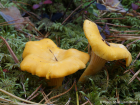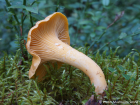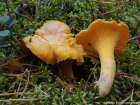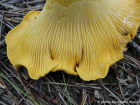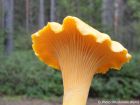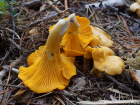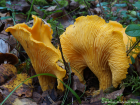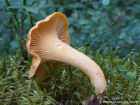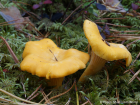Cap light yellow, bright yellow to orange in colour, fading with age. As young formed as a button and then turns more cone-shaped. The margin stays folded in for a long time and then often becomes wavy and uneven at maturity. The mushroom has gill-like veins under the cap that run down the stem, not gills. Flesh firm, thick, yellow. Stem solid, tapers downward from cap. The surface is smooth and the colour is similar to the cap or a lighter yellow to almost white. Spore print pale yellow to creamy white, sometimes with a slight pinkish tinge.
Microscopic Features: The spores are ellipsoidal and smooth, measuring 7-11 x 4-6µm. They are inamyloid (not staining with iodine) and appear hyaline (translucent and glass-like) in KOH (potassium hydroxide).
Similar species: Species that can be mistaken for Cantharellus cibarius include Hygrophoropsis aurantiaca, Omphalotus olearius and Omphalotus illudens.
Note: The present understanding regarding the number of Cantharellus species in North America that share the characteristics of the Common Chantarelle is uncertain. In the past, they were all grouped under "Cantharellus cibarius," but recent studies have revealed that Cantharellus cibarius is exclusive to Europe.
Cantharellus cibarius on the First Nature Web site.
Cantharellus cibarius on the MushroomExpert.Com Web site.
Many mushrooms are poisonous, and some can be lethally toxic. Distinguishing between edible and poisonous mushrooms can be very challenging. Therefore, we strongly advise against consuming wild mushrooms. This website does not contain any information about the edibility or toxicity of mushrooms.
Although efforts have been made to ensure accuracy on this website, the information may contain errors and omissions. Therefore, all content provided is for educational and informational purposes only and should not be relied upon or used as a basis for consuming any plants or mushrooms.
External links are provided for reference only. We do not endorse or take responsibility for the content, advice, or products found on these sites or in any advertisements shown on this website.
